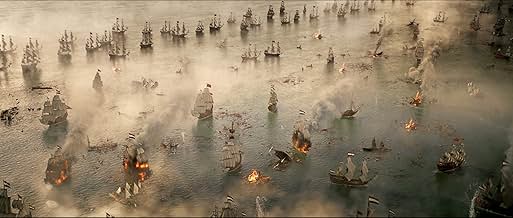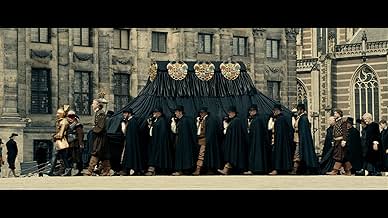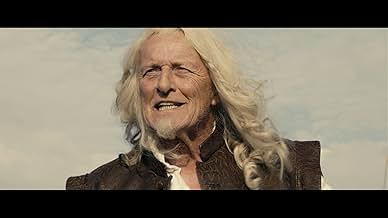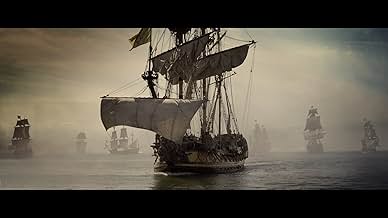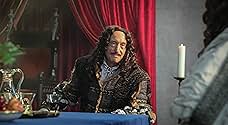When the young republic of The Netherlands is attacked by England, France, and Germany, and the country is on the brink of civil war, only one man can lead the country's strongest weapon, th... Read allWhen the young republic of The Netherlands is attacked by England, France, and Germany, and the country is on the brink of civil war, only one man can lead the country's strongest weapon, the Dutch fleet: Michiel de Ruyter.When the young republic of The Netherlands is attacked by England, France, and Germany, and the country is on the brink of civil war, only one man can lead the country's strongest weapon, the Dutch fleet: Michiel de Ruyter.
- Awards
- 2 wins & 4 nominations total
Egbert Jan Weeber
- Willem III
- (as Evert-Jan Weeber)
- Director
- Writers
- All cast & crew
- Production, box office & more at IMDbPro
Storyline
Did you know
- TriviaPaintings from the seventeenth century served as an inspiration for the design. In the beginning of this movie, when Klaartje (Pip Pellens), the family maid, pours milk, it is almost an exact replica of the famous painting "The Milkmaid" by Johannes Vermeer.
- GoofsWhen the camera zooms out from the aerial view of the French invading a city to a view from above the clouds, which then blends into a map, the view from space is actual modern day satellite photography. It shows many features and landmasses which did not exist in the 17th century. Most notable the whole province of Flevoland, the Maasvlakte near Rotterdam, the islands of Zeeland were not yet connected, various dams and bridges, and the greenhouses in the Westland.
- Alternate versionsIn the Netherlands, the movie was released in two different versions in the cinema. One of the versions lack explicit images of a lynching and also the death scene of the main character is made less horrific. This version has certification: 12 years and older.
- ConnectionsFeatured in Naval Warfare Expert Rates 9 Sea Battle Tactics in Movies and TV (2021)
- SoundtracksMichiel de Ruyter (Original Motion Picture Soundtrack)
Written by Trevor Morris
Published by Riva Media Records
courtesy of VOCfilm B.V.
Featured review
The general consensus is that Dredd is the superior adaptation of the Judge Dredd comic book hero, while the Stallone's Judge Dredd from 1995 is the inferior one. This is in part because Dredd, from 2012, gives us a more accurate and serious representation of the character from the comic books, and that much is true. The character of Judge Dredd is intended to be justice personifie: impartial, strict but fair. The movie gets that right. Karl Urban in the main role understood the character and did the comic books justice.
You can feel a big "butt" coming, don't you? The thing is, there is an assumption that the more faithful the adaptation is to the source material, the better, and that is debatable. If you're a fan of the original comic and of its main character, then this is movie will make you happy, but I think hate that mother f!@#er. As a stoic figure symbolizing justice in a world on the brink of collapse, Judge Dredd embodies the idea of "tough love" law enforcement. This raises two main issues.
1. That sure comes off as a far-right fantasy: a world full of criminals that can only be salvaged by the hard enforcement of a violent cop. You don't see this guy going around the hood trying to win some hearts and minds or try to understand the source of the problem in the society and do something about it.
The judicial apparatus employing him isn't shown building a new nursery in town. As the movie demonstrates, this guy walks issue a warning for the smallest violation (if you're lucky), and if you do not heed that warning, you're done for it.
The problem I have with the character of Judge Dredd is the same problem I have with the modern justice system as a whole: it is somehow both heartless and inept. It is a system that fails to recognize the complexities of human behaviour. It's the best solution we could come up with for a problem we can't solve.
I am not a leftist and I enjoy some right-wing fiction, but that fiction is usually based on very human principals of honour, unity, and strength. Judge Dredd comes off as a faceless creature, because that is what he is, and that is a character hard to root for.
2. This brings me to the 2nd issue. A character with little emotional range and a perpetual scowl makes for a dull protagonist. Dredd is not a boring movie, but the thrill originates from the cycle of tension and violence. There is that whole scene with a minigun doing glorious destruction, and the drug effects sure do look sparkly. However, we always get back to this face that just goes around doing his job and doesn't have any eyes. Some people praise this movie exactly for the reason that the character never takes off his mask. But you folks do realise the eyes are the key part of human communication and are often at the centre of an actor's performance?
The 1995 version of Dredd catches a lot of flak because Rob Scneider is annoying, and while I agree, I also understand that the idea behind that character was comic relief. A comic relief was invented for a reason: to lighten the otherwise bleak mood and to make the movie more entertaining. People may strongly disagree with this, but Schneider's character ultimately worked for that purpose. Dredd's sidekick in the new movie, played by Olivia Thirlby, is just a psychopath in training, starting as a human who cares and then slowly getting rid of her humanity with Dredd's guidance (though thankfully not completely succeeding at that in the end?) The 1995 version had a certain playful charm that is completely absent from Dredd.
The looks seem to be the greatest improvement over the previous adaptations. Dredd has a dark but colourful atmosphere. It looks considerably better than the plastic paradise that is the 1995 version. Something about the look of this movie reminds of the sci-fi shows from the 90s. There is a certain washed-out shininess and occasional motion blur that make it look a little...cheap. But that's just a stylistic choice, I suppose.
There is a considerable amount of subtext and exploration of morality throughout the scenes and its little details, though I think that the fans have assigned more subtext and meaning to the various scenes than there actually is. The story structure is solid. Moments introduced earlier in the movie pay off later on. In short, it is clear why this film is praised, but memorable it is not.
You can feel a big "butt" coming, don't you? The thing is, there is an assumption that the more faithful the adaptation is to the source material, the better, and that is debatable. If you're a fan of the original comic and of its main character, then this is movie will make you happy, but I think hate that mother f!@#er. As a stoic figure symbolizing justice in a world on the brink of collapse, Judge Dredd embodies the idea of "tough love" law enforcement. This raises two main issues.
1. That sure comes off as a far-right fantasy: a world full of criminals that can only be salvaged by the hard enforcement of a violent cop. You don't see this guy going around the hood trying to win some hearts and minds or try to understand the source of the problem in the society and do something about it.
The judicial apparatus employing him isn't shown building a new nursery in town. As the movie demonstrates, this guy walks issue a warning for the smallest violation (if you're lucky), and if you do not heed that warning, you're done for it.
The problem I have with the character of Judge Dredd is the same problem I have with the modern justice system as a whole: it is somehow both heartless and inept. It is a system that fails to recognize the complexities of human behaviour. It's the best solution we could come up with for a problem we can't solve.
I am not a leftist and I enjoy some right-wing fiction, but that fiction is usually based on very human principals of honour, unity, and strength. Judge Dredd comes off as a faceless creature, because that is what he is, and that is a character hard to root for.
2. This brings me to the 2nd issue. A character with little emotional range and a perpetual scowl makes for a dull protagonist. Dredd is not a boring movie, but the thrill originates from the cycle of tension and violence. There is that whole scene with a minigun doing glorious destruction, and the drug effects sure do look sparkly. However, we always get back to this face that just goes around doing his job and doesn't have any eyes. Some people praise this movie exactly for the reason that the character never takes off his mask. But you folks do realise the eyes are the key part of human communication and are often at the centre of an actor's performance?
The 1995 version of Dredd catches a lot of flak because Rob Scneider is annoying, and while I agree, I also understand that the idea behind that character was comic relief. A comic relief was invented for a reason: to lighten the otherwise bleak mood and to make the movie more entertaining. People may strongly disagree with this, but Schneider's character ultimately worked for that purpose. Dredd's sidekick in the new movie, played by Olivia Thirlby, is just a psychopath in training, starting as a human who cares and then slowly getting rid of her humanity with Dredd's guidance (though thankfully not completely succeeding at that in the end?) The 1995 version had a certain playful charm that is completely absent from Dredd.
The looks seem to be the greatest improvement over the previous adaptations. Dredd has a dark but colourful atmosphere. It looks considerably better than the plastic paradise that is the 1995 version. Something about the look of this movie reminds of the sci-fi shows from the 90s. There is a certain washed-out shininess and occasional motion blur that make it look a little...cheap. But that's just a stylistic choice, I suppose.
There is a considerable amount of subtext and exploration of morality throughout the scenes and its little details, though I think that the fans have assigned more subtext and meaning to the various scenes than there actually is. The story structure is solid. Moments introduced earlier in the movie pay off later on. In short, it is clear why this film is praised, but memorable it is not.
- How long is The Admiral?Powered by Alexa
Details
- Release date
- Country of origin
- Official sites
- Languages
- Also known as
- Admiral
- Filming locations
- Bergen op Zoom, Noord-Brabant, Netherlands(MarkiezenHof, King Charles Palace, Whitehall)
- Production companies
- See more company credits at IMDbPro
Box office
- Budget
- €8,000,000 (estimated)
- Gross worldwide
- $6,398,252
- Runtime2 hours 31 minutes
- Color
Contribute to this page
Suggest an edit or add missing content






